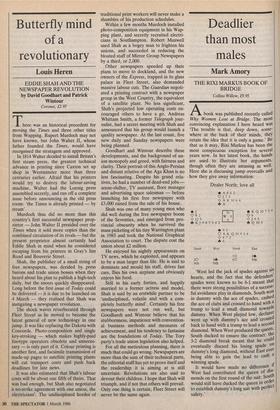Butterfly mind of a revolutionary
Louis Heren
EDDIE SHAH AND THE NEWSPAPER REVOLUTION by David Goodhart and Patrick Wintour Coronet, f2.95 There was an historical precedent for moving the Times and three other titles from Wapping. Rupert Murdoch may not have known, but John Walter II, whose father founded the Times, would have recognised the stratagem and approved.
In 1814 Walter decided to install Britain's first steam press, the greatest technical advance in printing since Caxton set up shop in Westminster more than three centuries earlier. Afraid that his printers would try to destroy the labour-saving machine, Walter had the Loenig press assembled secretly, and ran off a complete issue before announcing in the old press room: 'the Times is already printed — by steam'.
Murdoch thus did no more than this country's first successful newspaper prop- rietor — John Walter II presided over the Times when it sold more copies than the combined circulation of its rivals — but the present proprietor almost certainly had Eddie Shah in mind when he considered escaping from his printers in Gray's Inn Road and Bouverie Street.
Shah, the publisher of a small string of free newspapers, was derided by press barons and trade union bosses when they heard about his plan to publish a high-tech daily, but the sneers quickly disappeared. Long before the first issue of Today could be delivered — it is due to be launched on 4 March — they realised that Shah was instigating a newspaper revolution.
The shock waves reverberated through Fleet Street as he moved to become the latest general of new technology in one jump. It was like replacing the Dakota with Concorde. Photo-composition and single key-stroking — which makes highly-paid linotype operators obsolete and unneces- sary — is only part of it. Colour printing is another first, and facsimile transmission of made-up pages to satellite printing plants will cut transport costs and push back deadlines for late news.
It was also estimated that Shah's labour costs will be about one fifth of theirs. That was bad enough, but Shah also negotiated a no-strike agreement with one union, the electricians'. The undisciplined hordes of traditional print workers will never make a shambles of his production schedules.
Within a few months Murdoch installed photo-composition equipment in his Wap- ping plant, and secretly recruited electri- cians in Southampton. Robert Maxwell used Shah as a bogey man to frighten his unions, and succeeded in reducing the bloated staff of Mirror Group Newspapers by a third, or 2,000.
Other newspapers speeded up their plans to move to dockland, and the new owners of the Express, trapped in its glass palace in Fleet Street, also demanded massive labour cuts. The Guardian negoti- ated a printing contract with a newspaper group in the West Country, the equivalent of a satellite plant. No less significant, Shah's projected low operating costs en- couraged others to have a go. Andreas Whittam Smith, a former Telegraph jour- nalist, had a secret meeting with Shah and announced that his group would launch a quality newspaper. At the last count, five new daily and Sunday newspapers were being planned.
Goodhart and Wintour describe these developments, and the background of un- ion monopoly and greed, with fairness and clarity. Their portrait of this Anglo-Persian and distant relative of the Aga Khan is no less fascinating. Despite his grand rela- tives, he had a number of dead-end jobs scene-shifter, TV assistant, floor manager and advertising space salesman — before launching his first free newspaper with £3,000 raised from the sale of his house.
Shah was one of many young men who did well during the free newspaper boom of the Seventies, and emerged from pro- vincial obscurity when he survived the mass picketing of his tiny Warrington plant in 1983 and took the National Graphical Association to court. The dispute cost the union about £2 million.
He enjoyed his nightly appearances on TV news, which he exploited, and appears to be a man larger than life. He is said to dominate and mould his staff, drives fast cars, flies his own airplane and obviously enjoys his food.
Still in his early forties, and happily married to a former actress and model, Shah is said by an erstwhile partner to be `undisciplined, volatile and with a com- pletely butterfly mind'. Certainly his free newspapers were not run well, but Goodhardt and Wintour believe that his stubbornness, impatience with convention- al business methods and measures of achievement, and his tendency to fantasise are the foundations of Today. The Tory party's trade union legislation also helped.
For all the meticulous planning, there is much that could go wrong. Newspapers are more than the sum of their technical parts, the editorial staff has yet to prove itself and the readership it is aiming at is still uncertain. Revolutions are also said to devour their children. I hope that Shah will triumph, and if not that others will prevail. Only one thing is certain, Fleet Street will never be the same again.














































 Previous page
Previous page